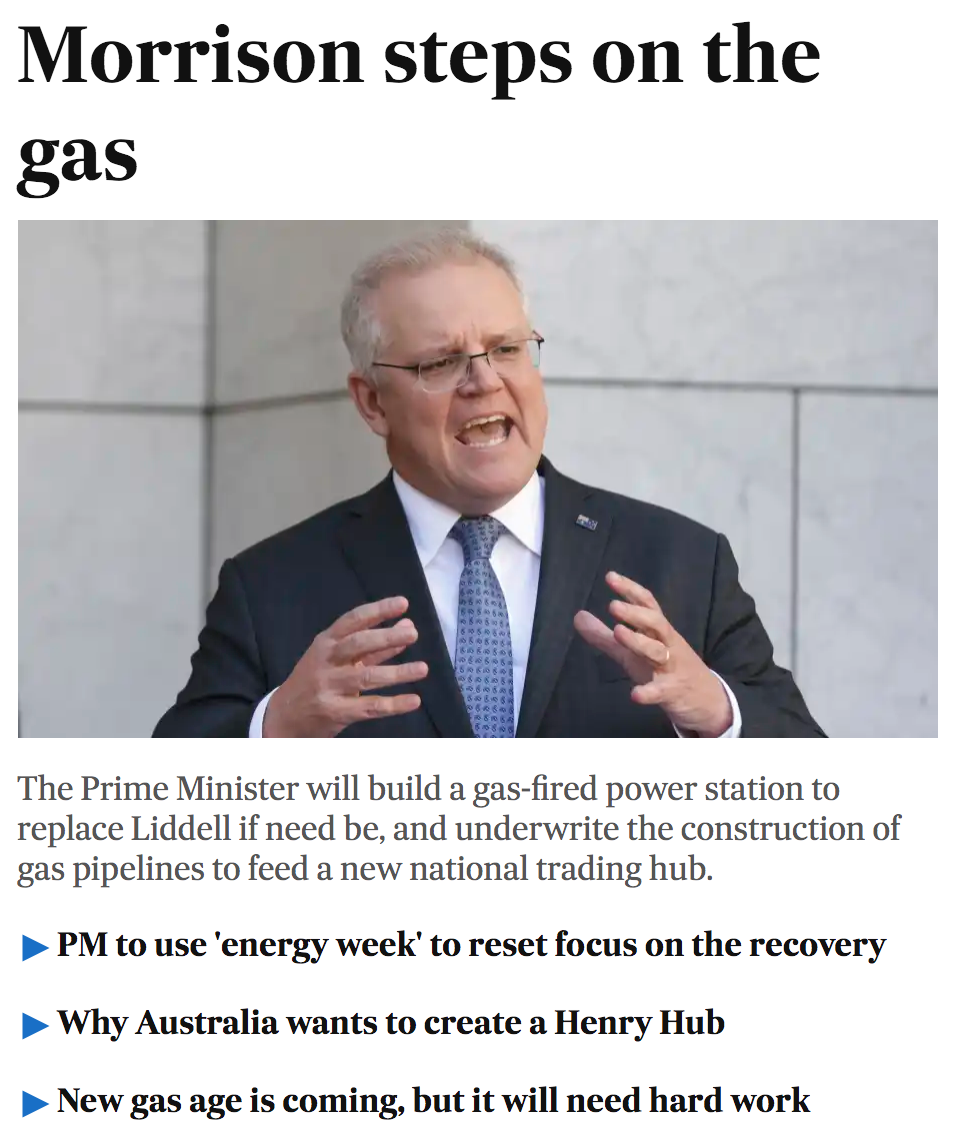
Gas Gush: The Toadies of Mainstream Media Trot Out Government’s Fossil Fuel Campaign

By Michael West, founder of Michael West Media
Gas fracking and a new fossil fuel power plant got a big leg-up today as News Corp, Nine Entertainment, ABC News and Guardian Australia faithfully splashed with the latest government gas plan on their front pages today.
This is not journalism. This is stenography. This is not balanced reporting. This is reporting a government press release one day early.
Australia’s captive mainstream media all splashed with the same story this morning, the Morrison Government’s fossil fuel public relations campaign. The Age, the Sydney Morning Herald, The Guardian, The Australian, the Australian Financial Review. They all featured the same story on gas. Now, breakfast TV and morning radio will be left to follow it up, unquestioning, now that it’s been “in the papers”.
 AFR’s version of a press release masquerading as news
AFR’s version of a press release masquerading as newsThe gas propaganda blitz did not feature the critical facts that gas is almost as polluting as coal, that fracking the Beetaloo Basin, the Galilee Basin and the North Bowen Basin will destroy water systems and endanger wildlife and farmland.
Neither did this media blitz, orchestrated by expert media manipulators in the offices of government, and keenly assisted by the gas lobby, mention that the gas multinationals which stand to benefit from this campaign have been acting as a cartel, ratcheting up gas prices at a cost to all Australians and siphoning profits offshore to tax havens.
Read More....
Secrecy Covers Up Abuse of Power and Poor Performance by Australia’s Security Services

By Jack Waterford with Pearls and Irritations
One would have to go back to the 1970s to find the nation so ill-served. All the more so as politicians have politicised national security, and reverted to 1960s games of gathering and using secret information for political purposes. It would not be strictly correct to describe the agencies themselves, or their leaders, as politically compromised — at least in a party-partisan way — but each now operates in a far from detached environment.
The ASIO of today is a fundamentally different organisation from that of 1949, 1954 (the Petrov defection) or for that matter 1983. The Cold War ended 31 years ago, before most ASIO employees were born, and the mindset of a much more technocratic organisation is not much shaped by Cold War experience or prejudices. After the fall of the Soviet Union, indeed, it had to invent some new functions to remain in business at all, and had settled mainly on politically motivated violence — aka terrorism — even before the events of September 11, 2001, which gave it new impetus, allowed it to more than double in size, and to warrant the Lubyanka- by-the-Lake in which it is presently headquartered. Modern ASIO heads speak at the National Press Club, and the organisation has a Twitter presence.
The War Against Terror saw conservative governments change the ASIO legislative charter to give it executive powers.
This was a big mistake.
Read More....

By Julian Savulescu, University of Oxford
Melbourne’s lockdown has been described as one of the harshest in the world. And jurisdictions outside Australia have taken other measures to limit the spread of COVID-19 once case numbers have eased.
So, in the absence of a reliable COVID-19 treatment or licensed vaccine, is lockdown still worth it?
To answer this, we not only need scientific evidence, we need ethics to decide which factors should weigh most heavily in our decision-making.
Some of these factors are not so obvious.
How should we measure the impact of COVID-19?
Clearly, when measuring the impact of COVID-19, cases and deaths are relevant. But a case is not necessarily “bad”. Although estimates vary, about 40-45% of cases are asymptomatic. And it’s not death (in itself) that matters.
Death is bad because it denies us life we could have had. But if you die one second earlier than you could have died, this is not particularly bad. What matters, ethically, is not death per se, but years of life lost.
Even this is not what ultimately matters. If you could live an extra 20 years in a coma, you would hardly call this a win. What matters is years of good (enough) life lost.
No comments:
Post a Comment